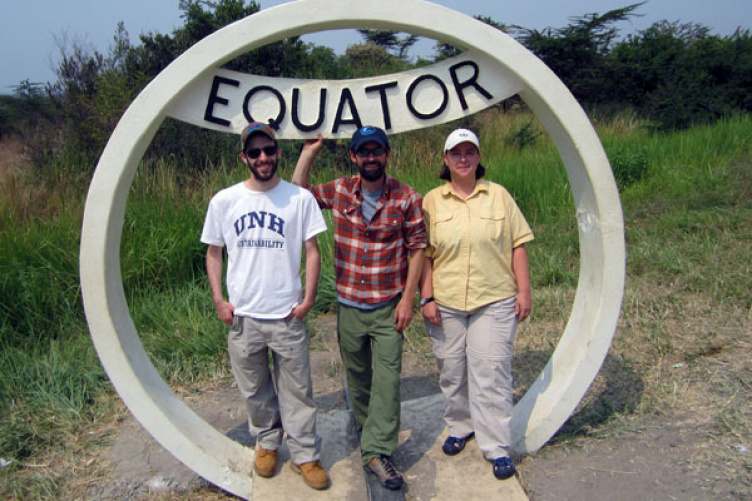
Last summer, Stuart Grandy brought something unexpected back from Uganda: a new perspective on teaching soil chemistry.
The soil biogeochemist and Assistant Professor of Natural Resources and the Environment in the College of Life Sciences and Agriculture (COLSA) at the University of New Hampshire (UNH) traveled to Africa in June to conduct research with his post-doctoral researcher Lisa Tiemann and Michael Casazza ’14, an undergraduate majoring in Environmental Conservation and Sustainability. There, the trio uncovered some of the properties of the clay minerals in Uganda that are very different from most soils in the U.S. Emboldened by this discovery, Grandy began developing the ideas that he expects will lay the groundwork for future projects in the region. Says Grandy, “I’m hoping to continue exploring the soil fertility issues that are limiting agricultural sustainability in Uganda. I want to more deeply understand the unique soil processes there, which are key to sustaining agricultural productivity and improving people’s livelihoods.”
In 2013, Grandy was awarded the Roland H. O’Neal Professorship, established by Virginia O’Neal ’34 in memory of her husband, which recognizes an outstanding, untenured member of the UNH teaching faculty. The award’s supplemental allowance enabled Grandy to travel to Uganda and do the hands-on research that strengthened his ability to incorporate this new understanding of clay mineralogy into his teaching of soil chemistry.
Grandy is a strong proponent of active and student-centered learning. “My students are given the opportunity to take an active role in how and what they learn,” says Grandy. “I use activities that involve an open dialogue between myself and the students.” In addition, Grandy guides dynamic small group discussion during which, he says, “a lot of learning occurs that has a tendency to be integrated into their knowledge more deeply.” Grandy also favors active debates in which students discuss their own perspectives and the ways in which they view soils in relation to the larger environment. “This is hands on, inquiry based learning where students are really responsible for taking an active role in their education,” says Grandy. “My classes are not ones where people come in and passively participate.”
In addition to the benefits to his students, a new project arose out of Grandy’s opportunity to conduct research in Uganda. Grandy, Tiemann, Casazza, and their colleagues at SUNY ESF, the University of Colorado, and Georgia State University, have applied for a grant to study black carbon in Ugandan soil. Black carbon is not just charcoal, but results from fire. “In natural systems, the grasslands burn to keep healthy,” says Grandy, “while in agricultural systems burning is the result of a perceived need to keep fields clear when planting the next crop.” These fires produce black carbon that enters soil, but in Uganda, the atmosphere is also clogged with black carbon particles produced from burning grasslands and crops, as well as from cooking on open fires and vehicle emissions. The team plans to study the link between burning and its effects on soil processes from both the addition of charcoal and the consequences of changing climate patterns due to atmospheric black carbon (aerosols). “We’ll be examining plant productivity in agricultural crops as an indicator of the combined effects of charcoal and aerosol production from biomass burning in the region,” says Grandy.
Meantime, the supplemental allowance from the Roland H. O’Neal Professorship will enable Grandy to return to Uganda to conduct additional research throughout the three-year term. The University initiated the Professorships program in 1990 to help support faculty members in their teaching, public service, and research. Grandy was nominated by Dean of COLSA, Jon Wraith, and subsequently awarded the Roland H. O’Neal Professorship by the Provost.
-
Written By:
Staff writer | Communications and Public Affairs

















































